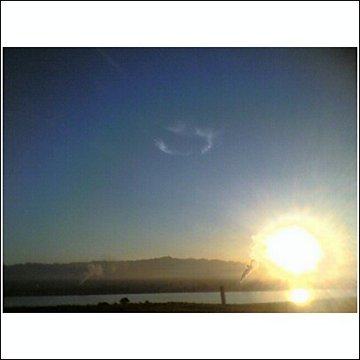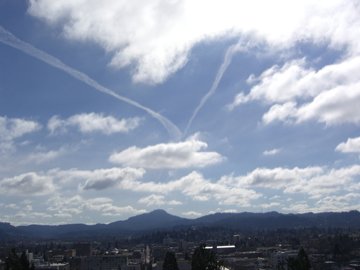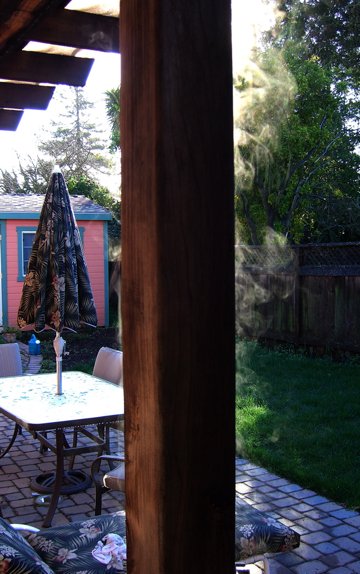Just to put it on the record before the beautiful memories start to fade:
The weather people were right: Saturday turned out rainy and windy, eventually. We rode into some light rain about 20 miles from the start of the 188-mile ride, but that was done with pretty quickly; if that was all we’d had to contend with, no one would have even remembered it. The northbound leg was pretty painless because we had a nice tailwind through the first mandatory stop (“control” in the language of brevets) at mile 46 or so in Petaluma. The breeze was a big help as we continued on, too. But off to the west, the hills were shrouded in falling rain, and it was raining by the time I got to Santa Rosa. It rained moderately for the next hour or so, just about all the way to our turnaround control in Healdsburg. By then, with more than 100 miles to go to get back to the start, everyone looked pretty wet. I was soaked, and couldn’t stand around much before I started to shiver. Luckily, I met a couple friends, Bruce and Rob, who were just finishing lunch and ready to leave; I had downed an orange juice and a protein shake–my stomach had felt too upset earlier to eat anything, and the liquid fuel was working just fine–and I rode with my two East Bay compadres along the edge of the vineyards down to the Russian River, then out to the coast. There, the principal weather factor turned to wind: A strong breeze was rising along Highway 1, and it was mostly right in our faces. About 20 miles after reaching the ocean, and about 57 miles from the end of the ride, it started to rain again; the wind had grown strong enough that, along with our forward motion on the bikes, the drops seemed to blow horizontally and stung my face. It rained with increasing intensity all the way back to the finishing control at the Golden Gate Bridge. It was so windy up on the span that we all had to dismount to walk around the north tower, and even then we had to lean into every step to make any progress at all; with the rain, it felt like we were getting sandblasted.
But it wasn’t all one big gray blur. Every once in a while I’d catch a piece of the scene–the glistening green slope of a mountainside before the storm really hit, the nearly-obscured hills or beaches as the rain rolled in, the rain blowing through the light cast by streetlamps–and the beauty of it all was striking. Or maybe that was just an attempt to justify subjecting myself to an experience that at points seemed crazy.
At one point, Rob and I got flat tires just below one of the last summits of the ride. The road was completely dark except for bike and car lights. We were in the middle of the storm in a dark, dripping forest, and we made our repairs with cold, wet hands. I, at least, didn’t have perfect confidence that my tire would stay inflated, but within 20 minutes or so we were riding again. One thing I like about this climb, from Nicasio up and over to San Geronimo, is that when you approach the summit, there’s always a pronounced breeze–a wind moving through the notch in the hills, a signal that you’re just about at the top. Last night, you could hear the wind roaring above us as we went up the slope. Instead of the usual breeze, a gale was blowing so hard that I wondered at first whether I could keep my bike upright. Instead of the usual fast, effortless descent, we had to keep pedaling to make progress into the wind. It was a relief to get down. We heard the same roar going up the other hills we had to cross in Marin County and faced the same wind-blown descents each time.
My hardest day ever on a bicycle? The way memory works–smoothing over the most unpleasant parts–it’s tough to say. But it would definitely be up there. I got soaked early and knew I was beyond hope of drying out (if this had been a multi-day ride, I would have found a laundromat and thrown my stuff in a dryer). It rained hard and for a long time, and it was on the chilly side–low to mid 50s all day. The wind was a special factor. As I said to Rob and Bruce after descending into San Geronimo, “That was wild.” I suppose I felt exhilarated, but a lot of that had to do with knowing that I’d be done riding in an hour or two with any luck.
The headline up there promises a list. So here they are, a quick review of the harshest weather rides I remember (one might be struck by how many of these are in the last four years; that’s when I started randonneuring and bought into the notion, perhaps to be explored later, that a little rain or heat or cold shouldn’t keep you from going out and riding all day and night).
1. February 24, 2007: San Francisco 300 brevet. 120 miles of rain and wind. Finished.
2. May 3-5, 2003. Davis 600 brevet. Rained for six or seven hours in middle of event (and for me, in the middle of the night). Cold pouring rain at the turnaround point, situated in a redwood grove in a state park. The hardship wasn’t so much the storm, but the distance still left to cover after I got a good soaking. I finished and qualified for PBP.
3. March 18, 2006: San Francisco 400 brevet. 55 miles into a 20-35 mph headwind on the western edge of the Central Valley. It took 11 and a half hours to finish the first 200 kilometers; the wind-aided return south took eight and a half hours.
4. July 22, 2006. Bay in a Day Double Century. High temperature on the road: 118 degrees. Started early, finished late, and got cooked in between.
5. January 28, 2006: San Francisco 200 brevet. Rain for 100 of the 125 miles on the road. But wind wasn’t much of a factor until near the very end. Finished.
6. September 14-15, 2006: Days two and three of the Last Chance 1,200 in Colorado and Kansas. We had a good 36 hours of 20-30 mile an hour winds; the breeze was from the south, meaning it was mostly a crosswind, but it made bike handling very tough and tiring. I finished the 1,000 portion of my ride, but did not finish the planned 200 afterward due to an Achilles tendon injury.
7. June 24-25, 2005: Great Lakes Randonneurs 600 brevet. Thunderstorms struck at the 300-kilometer mark; after two-and-a-half-hour delay, rode most of the night in the storm with bolts of lightning for extra illumination. I quit at the 400-kilometer mark.
8. April 12, 2003: Visiting Chicago for my parents’ 50th anniversary, I decide to take my brother-in-law Dan’s bike out for a ride. Temperature was about 40, and the bonus factor was a stiff breeze off Lake Michigan. I rode across the Wisconsin state line, called my sister’s house to announce my accomplishment, then enjoyed a wonderful tailwind all the way back to the North Side.
9. July 13, 1969: I take it into my 15-year-old head to ride from our place in Crete, Illinois, to Kankakee River State Park, about 35 miles away, on my red three-speed Schwinn. The temperature reached the mid-90s on a mostly unshaded route. I had a map. I did not have anything to eat or drink, though I did bring money and bought stuff along the way and I wasn’t shy about stopping to ask people for water. Finished the ride and then repeated it two days later with two friends; we tied sleeping bags and other camping gear to our bikes and hit the road. Even though I was really tired and sore and probably dehydrated and sunstruck and got a ride home from my dad, I had sort of a good time. Maybe this ride explains all the others.
Technorati Tags: berkeley, california, cycling, randonneuring
Like this:
Like Loading...





